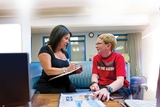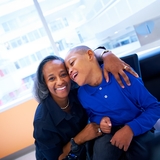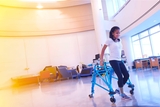Division of Physical Medicine and Rehabilitation

The Division of Physical Medicine and Rehabilitation at Children's Hospital of Philadelphia offers world-class pediatric rehabilitation services. We help each patient realize their maximum potential for recovery, function and self-sufficiency. We offer the full range of care, including acute care consultation, inpatient rehabilitation and outpatient services.
We will create a comprehensive treatment plan if your child has experienced an injury or illness that has caused a loss of function or abilities in:
- Daily living activities
- Mobility
- Thinking, learning
- Communication
In addition to medical care (such as medications and surgical procedures), our expert team addresses your child’s needs for physical/occupational therapy, splinting/bracing, adaptive equipment and more. We will support your family through every step of your child’s rehabilitation journey.
How we serve you
We will give your child the very best care. To do this, we have specialized programs that help children with different rehabilitation needs or during different stages of their treatment.
-
Adaptive Equipment Clinic -
Advanced Cardiac Therapies for Heart Failure Patients -
Advanced Tone Management Multidisciplinary Clinic -
Center for Rehabilitation -
Cerebral Palsy Program -
Leukodystrophy Center -
Mitochondrial Medicine Program -
Myelitis and Myelopathy Clinic -
Neuromuscular Program -
Pediatric Stroke Program -
Rett Syndrome Clinic -
Recovery and Return Clinic -
Spina Bifida Program
Conditions we treat
We care for children with a wide variety of conditions that can result in a loss of function.
- Brain injury, traumatic and non-traumatic
- Cardiopulmonary conditions
-
Cerebral palsy - Connective tissue disorders
-
Dystonia -
Leukodystrophy -
Limb-length discrepancy (amputations) -
Mitochondrial respiratory disorders - Neuromuscular conditions
-
Spina bifida -
Spinal cord injuries - Orthopedic conditions
-
Spasticity

Meet your team
Every person on your child’s team has the same goal: to see your child thrive. Our pediatric rehabilitation team includes doctors, advanced practice providers, nurses and other experts.

Physical Medicine and Rehabilitation locations
Find locations where our pediatric rehabilitation team treats children.

Our research
Our research is broad and diverse. Examples of our research topics include altering the trajectory of motor development in children with cerebral palsy, gait rehabilitation after stroke, balance/spatial orientation rehabilitation and modulation of nerve activity.
Your donation changes lives
A gift of any size helps us make life-changing breakthroughs for children everywhere.
